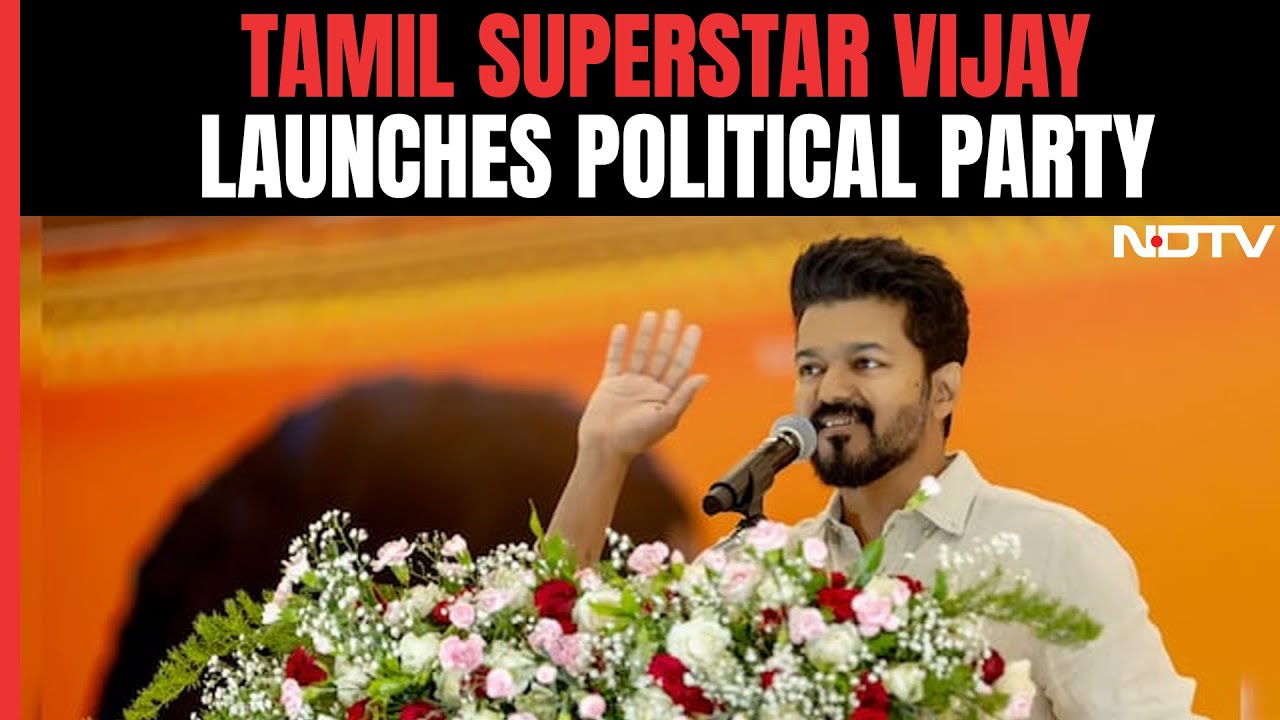


Popular actor Vijay officially launched his political party Tamizhaga Vetri Kazhagam (TVK) in Tamil Nadu, delivering a strong message to the public. He emphasized the party's ideology of "ondre kulam, oruvane thevan" and criticized the DMK as a "family party" that deceives the people. He also expressed his commitment to secular social justice and gave up his successful career to enter politics, trusting the support of the people.
Secular Social Justice: Vijay's Political Journey and Its Significance
Vijay, a renowned Tamil actor, has recently made a significant foray into politics with the launch of his political party, Tamizhaga Vetri Kazhagam (TVK). His entry into the political arena has sparked both excitement and curiosity among the public, particularly in the context of his commitment to "secular social justice."
Background: Secularism and Social Justice in India
India has a long history of secularism, enshrined in its constitution. Secularism in this context refers to the separation of state and religion, ensuring that no religion receives preferential treatment or interference from the government.
Social justice, on the other hand, entails the equitable distribution of resources and opportunities, addressing systemic inequalities based on caste, class, gender, and other factors. It is a fundamental principle enshrined in the Indian Constitution, aimed at creating a just and egalitarian society.
Vijay's Manifesto: A Focus on Secular Social Justice
Vijay's TVK party platform emphasizes the ideals of "ondre kulam, oruvane thevan" (One caste, one God), embodying the principles of secularism and social justice. He has criticized the incumbent Dravida Munnetra Kazhagam (DMK) government for being a "family party" that exploits the people.
Vijay's manifesto outlines a range of policies aimed at promoting social justice, including:
Top 5 FAQs on Vijay's Political Journey
What is Vijay's ideology for his political party?
Why did Vijay decide to enter politics?
What is the significance of Vijay's entry into politics?
What are the key policies proposed by Vijay's party?
What are the challenges that Vijay's party may face?
Conclusion
Vijay's entry into politics with a focus on secular social justice is a significant development. His commitment to addressing inequality and promoting social harmony has resonated with many people. While the journey ahead for Vijay's party is uncertain, his entry into the political arena has sparked a renewed interest in the pursuit of a just and equitable society in Tamil Nadu.

Union Home Minister Amit Shah expressed his confidence that the BJP will emerge victorious in the upcoming assembly elections in West Bengal. He also criticized Chief Minister Mamata Banerjee and the ruling TMC for their opposition towards the special revision exercise for the voter list. The minister defended the legitimacy of the process and supported the Election Commission, while the opposition claims it is a ploy to manipulate voter lists before the polls.

Union Home Minister Amit Shah criticised the opposition's manifesto promise of providing government jobs in Bihar if they come into power. Calling it "nonsensical", Shah stated that such a promise is absurd and the opposition knows they will never come to power and will not have to fulfil any promises made. He also pointed out that the opposition's manifesto ignores the development strides made in Bihar, such as electricity and clean water reaching every village.

In an exclusive interview with News18 India, Union Home Minister Amit Shah dismissed Rahul Gandhi's allegations of "vote chori" (vote theft) and assured the people of Bihar that the BJP will take action against every single infiltrator in the country. He also addressed concerns about Nitish Kumar's health and stated that the Bihar CM was holding four rallies a day, proving that there was no question of his health being in poor shape. Additionally, Shah criticized the opposition's attempt to create a negative perception about Nitish Kumar.

In a recent interview with News18 India's "Sabse Bada Dangal Bihar 2025", Union Home Minister Amit Shah confidently stated that the NDA will form a government with an unprecedented two-thirds majority in the upcoming Bihar assembly elections. Shah also vehemently denied any concerns raised by the opposition regarding the health of Chief Minister Nitish Kumar, stating that both he and Kumar are holding four rallies a day. This marks a major shift in the political equation in Bihar, as the BJP and JD(U) are contesting an equal number of seats, a first in the state's electoral history.

PM Modi delivered a speech at the Maritime Leaders' Conclave in Mumbai, praising the government's efforts in revolutionizing and modernizing the country's shipping sector. He emphasized the nation's ports as being among the most efficient in the developing world, declaring that India has made significant progress in this area.

Union Minister Dharmendra Pradhan, who is also the BJP's in-charge for the Bihar polls, has strongly criticized Congress leader Rahul Gandhi for his derogatory comments against PM Modi. Pradhan has demanded a public apology from Gandhi for his remarks, stating that they are against basic norms of public discourse. He further added that this reflects the Congress' deep-rooted resentment and frustration towards PM Modi and his leadership. Meanwhile, Rahul Gandhi has kicked off his poll campaign in Bihar with a scathing attack on PM Modi, accusing him of "enacting all types of drama" for votes and running the state through remote control.

Elon Musk's xAI has launched Grokipedia, an AI-powered online encyclopedia to rival Wikipedia. Musk aims for the platform to be a "massive improvement" and free from any political bias. While Grokipedia currently sources content from Wikipedia, Musk plans to have all original content by the end of the year. This development adds to Bihar's political landscape, where leaders like Lalu Prasad and Nitish Kumar have dominated with their OBC politics, while Nitish's developmental narrative has transformed the state's political landscape.

BJP leader Chandrashekhar Bawankule sparked controversy with his statement that party workers' phones and WhatsApp groups are being monitored ahead of local body elections. Shiv Sena leader Sanjay Raut demanded his arrest, alleging that the phones of several Opposition leaders were also tapped. Bawankule clarified his statement, but the Sena leader questioned the involvement of BJP offices and technology networks, calling it a potentially anti-national act.

The Election Commission (EC) has announced the schedule for Special Summary Revision (SIR) of electoral rolls in 12 states and Union Territories (UTs) for the year 2025, excluding Assam due to the ongoing National Register of Citizens (NRC) process. While the BJP has welcomed the announcement, the Congress has raised concerns and questioned the decision. The Chief Election Commissioner (CEC) has stated that Assam has a separate provision in citizenship laws and the NRC process must be taken into consideration, causing potential delays in the SIR preparations. Despite the physical closure of banks in Ranchi and Patna, financial services will remain available through digital and self-service platforms, so customers are advised to use online banking and plan any in-branch visits accordingly.

In a step towards promoting ethical governance and preventing corruption, Chief Secretary Atal Dulloo administered the Integrity Pledge to officers and officials at the Civil Secretariat in Srinagar. This marked the beginning of the National Vigilance Awareness Week, a nationwide campaign held annually by the Central Vigilance Commission. The theme for this year is "Vigilance: Our Shared Responsibility", emphasizing the role of collective efforts in upholding integrity, transparency, and accountability in public administration. Throughout the week, various activities will be conducted to sensitize employees and citizens on the importance of honesty and integrity in governance.